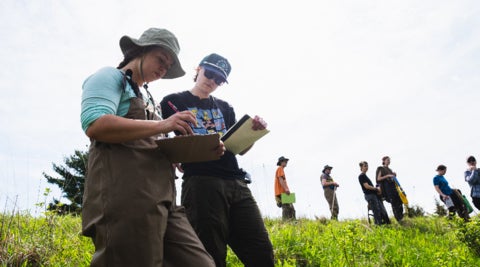Climate and Environmental Change degree

Climate science for climate solutions.
Get ready to tackle the climate crisis. In this program, you’ll study the science behind the challenges facing our planet’s environment.
You'll combine biology, chemistry, physics, and earth science with human geography to address challenges such as flooding, permafrost thawing, drought and forest fires, peatland degradation, rising sea levels and coastal change, and changing economic opportunities in climate sensitive sectors.
You’ll master practical tools like computer modelling and hone the skills to build a low-carbon future. Enrich your classroom learning with hands-on experience in labs and fieldwork (and paid work experience through co-op).
What courses will you take in Climate and Environmental Change?
First-year courses
January to April
- GEOG 102 – Environmental Systems: Processes and Change
- GEOG 207 – Climate Change Fundamentals
- ENVS 131 – Communications for Environmental Professionals
- ENVS 278 – Applied Statistics for Environmental Research
- One course from
This is a sample schedule. Courses or when a course is offered may change depending on availability.
After first year
Most of the classes you’ll take will be Geography courses. With your remaining classes, you can choose electives from the 100 subject areas at Waterloo.
Customize your degree in Climate and Environmental Change
You can add additional areas of expertise to your degree by including one of the specializations within the program.
- Geomatics
- Economy and Society
- Aviation
You can also choose one of the minors available to all Waterloo students.
Faculty:
Faculty of Environment
Degree:
Bachelor of Science in Climate and Environmental Change
Available as a co-op program?
Yes
Available as a regular program?
Yes
Available as a minor?
No
Study your interests. Build hands-on experience through field courses starting in first year, and add an optional international experience in your upper years for an unforgettable perspective on your studies.
Research-led teaching and learning. Attend research seminars or even apply for co-op work terms with professors who are part of Waterloo's Interdisciplinary Centre on Climate Change.
Co-op = relevant paid work experience
Explore careers that help solve the climate crisis by alternating school terms and paid co-op work terms throughout your degree. You'll gain experience, earn money, and discover which career areas interest you.
You might work as an environmental consultant assistant, water treatment project assistant, environmental services and approvals assistant, or an undergraduate research assistant.
Co-op work-study sequence
Starting in second year, you'll normally alternate between school and work every four months, integrating your classroom learning with real-world experience. You can return to the same employer for a couple of work terms to gain greater knowledge and responsibility or work for different employers to get a broad range of experience.
| Year | September to December (Fall) | January to April (Winter) | May to August (Spring) |
|---|---|---|---|
| First | Study | Study | Off |
| Second | Study | Co-op | Study |
| Third | Co-op | Study | Co-op |
| Fourth | Study | Study | Co-op |
| Fifth | Co-op | Study | - |
Your first work term will be halfway through second year (January to April 2028).
What can you do with a degree in Climate and Environmental Change?
Your career path will depend on your interests. You could continue your education in a variety of areas, including Waterloo’s Master of Climate Change degree or choose to go directly into a career with a wide variety of employers.
Possible job titles
- Climate modeler
- Climate risk scientist
- Policy analyst
- Carbon market analyst
- Renewable energy specialist
- Environmental consultant
Possible employers
- Federal, provincial, and municipal governments
- Local and international NGOs
- Consulting firms
- Research centres
- Colleges and universities
Learn about the future of careers in environment, sustainability, and geography.
Admission requirements
Ontario students: six Grade 12 U and/or M courses including
- English (ENG4U) (minimum final grade of 70% is required)
- Any Grade 12 U Mathematics (minimum final grade of 70% is required)
- Chemistry or Physics
Recommended courses: Biology, Earth and Space Science, or World Issues
Expected admission range: High 70s
Not studying in Ontario? Search our admission requirements.
How to apply
Apply directly to this program on your application.
Success starts at Waterloo
As home to Canada's largest faculty of environment and the world's leading co-op program, Waterloo is the only place where you can test drive up to five careers before you graduate.



*University of Waterloo Key Performance Indicators 2024
**for social science programs, which include programs within the Faculty of Environment
Get information about programs, applying, and more!
Subscribe to our monthly newsletter
Get valuable updates and tips sent straight to your inbox!
Contact us

Questions about courses, programs, requirements, or careers?
Please contact Megan Muir, our Faculty of Environment recruitment co-ordinator who can answer any questions you have.